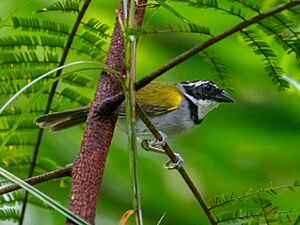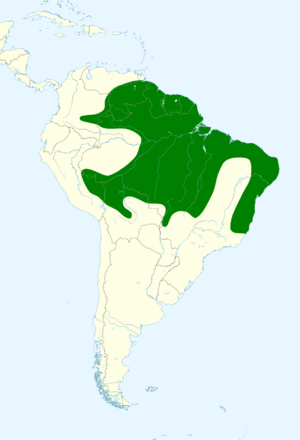Pectoral sparrow facts for kids
Quick facts for kids Pectoral sparrow |
|
|---|---|
 |
|
| Pectoral Sparrow in Rio Formoso, Pernambuco, Brazil | |
| Conservation status | |
| Scientific classification |
|
| Kingdom: | Animalia |
| Phylum: | Chordata |
| Class: | Aves |
| Order: | Passeriformes |
| Family: | Passerellidae |
| Genus: | Arremon |
| Species: |
A. taciturnus
|
| Binomial name | |
| Arremon taciturnus (Hermann, 1783)
|
|
 |
|
| Script error: The function "autoWithCaption" does not exist. | |
| Synonyms | |
|
|
Script error: No such module "Check for conflicting parameters".
The pectoral sparrow (Arremon taciturnus) is a cool little bird. It belongs to the Passerellidae family, which includes many sparrows and buntings. You can find this bird in several South American countries. These include Bolivia, Brazil, Colombia, French Guiana, Guyana, Peru, Suriname, and Venezuela. It loves living in warm, wet forests in low-lying areas. In Brazil, people call it tico-tico-de-bico-preto. This name means "black-billed sparrow."
How Scientists Named the Pectoral Sparrow
Scientists give every living thing a special name. This helps everyone know exactly which animal or plant they are talking about. The pectoral sparrow got its first description in 1779. A French scientist named Georges-Louis Leclerc, Comte de Buffon wrote about it. He called it "L'Oiseau Silencieux," which means "The Silent Bird."
Later, in 1783, another French scientist, Johann Hermann, gave it a scientific name. He called it Tanagra taciturna. The word taciturnus comes from Latin. It means "silent" or "quiet." Today, this bird is placed in a group called Arremon. This group was created by a French bird expert, Louis Pierre Vieillot, in 1816.
Different Kinds of Pectoral Sparrows
Scientists also divide species into smaller groups called subspecies. These are like different versions of the same animal. They might look a little different or live in slightly different places. There are three known subspecies of the pectoral sparrow:
- A. t. axillaris (named by Philip Sclater in 1854) – You can find this one in northeast Colombia and west Venezuela.
- A. t. taciturnus (named by Hermann in 1783) – This group lives in east Colombia, central and south Venezuela, the Guianas, the Amazon region of Brazil, and northeast Bolivia.
- A. t. nigrirostris (named by Sclater in 1886) – This subspecies is found in southeast Peru and north Bolivia.
Where Does the Pectoral Sparrow Live?
The pectoral sparrow lives in many parts of South America. Its main home is the Amazon Basin, which is a huge area of rainforest. However, you won't find it in the very western parts of the Amazon. Besides the Amazon jungle, it also lives in eastern and northeastern Brazil.
Its favorite habitat (the natural place where it lives) is moist lowland forests. This means forests that are not very high up and get a lot of rain.
 | Claudette Colvin |
 | Myrlie Evers-Williams |
 | Alberta Odell Jones |


